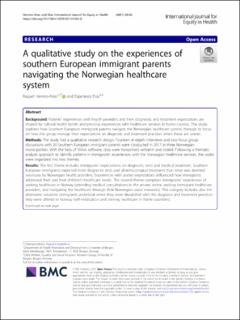| dc.contributor.author | Herrero-Arias, Raquel | |
| dc.contributor.author | Diaz, Esperanza | |
| dc.date.accessioned | 2021-05-07T12:47:23Z | |
| dc.date.available | 2021-05-07T12:47:23Z | |
| dc.date.created | 2021-01-19T14:44:57Z | |
| dc.date.issued | 2021-01-21 | |
| dc.identifier.issn | 1475-9276 | |
| dc.identifier.uri | https://hdl.handle.net/11250/2754192 | |
| dc.description.abstract | Background Patients’ experiences with health providers and their diagnostic and treatment expectations are shaped by cultural health beliefs and previous experiences with healthcare services in home country. This study explores how Southern European immigrant parents navigate the Norwegian healthcare system, through its focus on how this group manage their expectations on diagnosis and treatment practices when these are unmet. Methods The study had a qualitative research design. Fourteen in-depth interviews and two focus group discussions with 20 Southern European immigrant parents were conducted in 2017 in three Norwegian municipalities. With the help of NVivo software, data were transcribed verbatim and coded. Following a thematic analysis approach to identify patterns in immigrants’ experiences with the Norwegian healthcare services, the codes were organized into two themes. Results The first theme includes immigrants’ expectations on diagnostic tests and medical treatment. Southern European immigrants expected more diagnostic tests and pharmacological treatment than what was deemed necessary by Norwegian health providers. Experiences with unmet expectations influenced how immigrants addressed their and their children’s healthcare needs. The second theme comprises immigrants’ experiences of seeking healthcare in Norway (attending medical consultations in the private sector, seeking immigrant healthcare providers, and navigating the healthcare through their Norwegian social networks). This category includes also the alternative solutions immigrants undertook when they were dissatisfied with the diagnosis and treatment practices they were offered in Norway (self-medication and seeking healthcare in home countries). Conclusions Cultural health beliefs and previous experiences with healthcare services from home country shaped immigrants’ expectations on diagnosis and treatment practices. This had great implications for their navigation through the healthcare system and interactions with health providers in the host country. The study suggests that successful inclusion of immigrants into the Norwegian healthcare system requires an acknowledgment of the cultural factors that influence access and use of healthcare services. Exploring immigrants’ perspectives and experiences offers important information to understand the challenges of cross-cultural healthcare and to improve communication and equitable access. | en_US |
| dc.language.iso | eng | en_US |
| dc.publisher | BioMed Central | en_US |
| dc.rights | Navngivelse 4.0 Internasjonal | * |
| dc.rights.uri | http://creativecommons.org/licenses/by/4.0/deed.no | * |
| dc.title | A qualitative study on the experiences of southern European immigrant parents navigating the Norwegian healthcare system | en_US |
| dc.type | Journal article | en_US |
| dc.type | Peer reviewed | en_US |
| dc.description.version | publishedVersion | en_US |
| dc.rights.holder | Copyright the authors. | en_US |
| dc.source.articlenumber | 42 | en_US |
| cristin.ispublished | false | |
| cristin.fulltext | postprint | |
| cristin.fulltext | original | |
| cristin.qualitycode | 1 | |
| dc.identifier.doi | 10.1186/s12939-021-01384-8 | |
| dc.identifier.cristin | 1874501 | |
| dc.source.journal | International Journal for Equity in Health | en_US |
| dc.source.40 | 20 | |
| dc.identifier.citation | International Journal for Equity in Health. 2021, 20, 42. | en_US |
| dc.source.volume | 20 | en_US |

